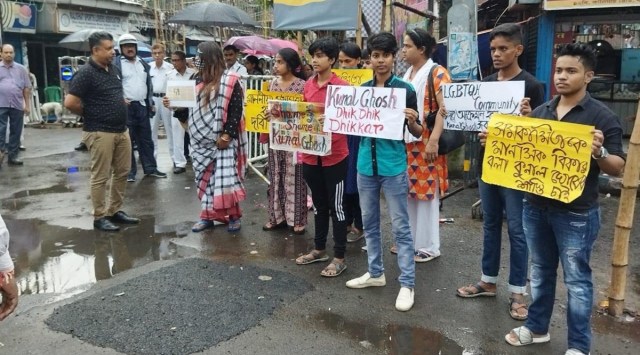
Just about a month ago, the internet celebrated the union of a gay couple in Kolkata. The Instagram-friendly pictures from the wedding, which was attended by a number of known faces of the city, an attestation to Kolkata’s queer-friendly credentials.
Well, it took only a few weeks to bring that illusion crashing down thanks to the most unlikely set of circumstances.
Earlier this week, when BJP leader Suvendu Adhikari was leading one of the party’s biggest campaigns in West Bengal in recent times, Nabanna Abhiyan (March To Secretariat), little did he know that he would find the queer community of Bengal rallying behind him in a few days. A community, if I may add, his party has done precious little for in all these years. But such was providence. As he was being detained on Tuesday, Adhikari refused to be touched by women police personnel. “Don’t touch me, I am male,” he said. And it’s almost as if the whole of Bengal broke into guffaws.
In between guffaws, veteran TMC leader, Madan Mitra, asked media personnel “Is he not sure about his gender? Why did he have to say he is male?”
A question most effeminate men must have tackled in school, but surely one can expect better from elected representatives? Evidently not. Looking at the sequence of events to follow, one could presume that the party’s top brass had taken upon itself to conduct a masterclass in homophobia.
Abhishek Banerjee, Trinamool Congress general secretary and Mamata Banerjee’s nephew suggested that Adhikari is a “woman-hating” and “man-loving” neta. “To save a woman-hating, man-loving BJP neta, they have stayed a murder investigation,” said Banerjee without naming Adhikari. Banerjee, however, did mention that his party supports the right of a person to choose his or her partner.
But no one did it better than senior TMC spokesperson Kunal Ghosh. Flinging his hands, shaking his upper body, he recreated the moments leading to Adhikari’s arrest for television channels.
‘Don’t touch my body, don’t touch my body,” he said, in a shrill voice.
If his prime-time performance was chillingly close to locker-room bullying most queer men have been exposed to, Ghosh ensured that there are triggers galore with his follow-up statement. “There is a sexually-perverted, homosexual leader. Police should determine who he is,” he said. It’s almost as if Section 377 was never decriminalised. Ghosh’s casual linking of homosexuality with perversion drags the discourse around queer existence in India back several decades. And it matters because when policymakers deem you “perverted”, you become an easy target for all.
If that was not enough, the TMC organised a march against the BJP on September 15, holding placards ridiculing Adhikari’s “don’t touch my body” remark. One of the posters said ‘Under the 56-inch leader’s chest, someone says don’t touch me, I am male’.
The idea of what it means to be a “male” (and a “female”) has dominated political speeches for ages and little has changed even now. Our politicians don’t think twice before branding ineptitude and cowardice as traits of a Hijra or an effeminate man. Chest-thumping, moustache-twirling machismo is to be lauded, anything in contradiction is to be ridiculed, termed deviant behaviour.
In 2018, when a group of girls at Kolkata’s Kamala Girls High School were made to sign a confession letter stating that they are lesbian, the then education minister of Bengal, Partha Chatterjee, said he won’t tolerate “lesbianism in schools” and that it is against Bengali culture. He never apologised for it.
Activists from the queer community of Kolkata held a protest outside CM Mamata Banerjee’s house in Kalighat on September 16, but is TMC the sole culprit here? One can never forget how Shashi Tharoor’s attempt to introduce a private member’s bill to amend Section 377 in 2015, was laughed out of Parliament by MPs. Not even a discussion was allowed on it. Watching the ignominy of Tharoor, listening to the mirthful dismissal by MPs, the queer community of India knew where exactly it stood.
But then this is India and not a day passes here without people in positions of power (and responsibility) making statements steeped in prejudices. Without thinking of the consequences, without bothering about the way it affects the most vulnerable. This makes me wonder how Bengal’s most celebrated queer personality, filmmaker Rituparno Ghosh, would have reacted to all this had he been alive. Rituparno once called out a popular comedian for mimicking him. “When you are mimicking me, you are not just mimicking me. You are making fun of an effeminate, queer person. You are making fun of people who are anyway too afraid to express themselves. You have no right to do so,” Rituparno told the comedian.
I wonder what Rituparno would have told Kunal Ghosh.
premankur.biswas@indianexpress.com